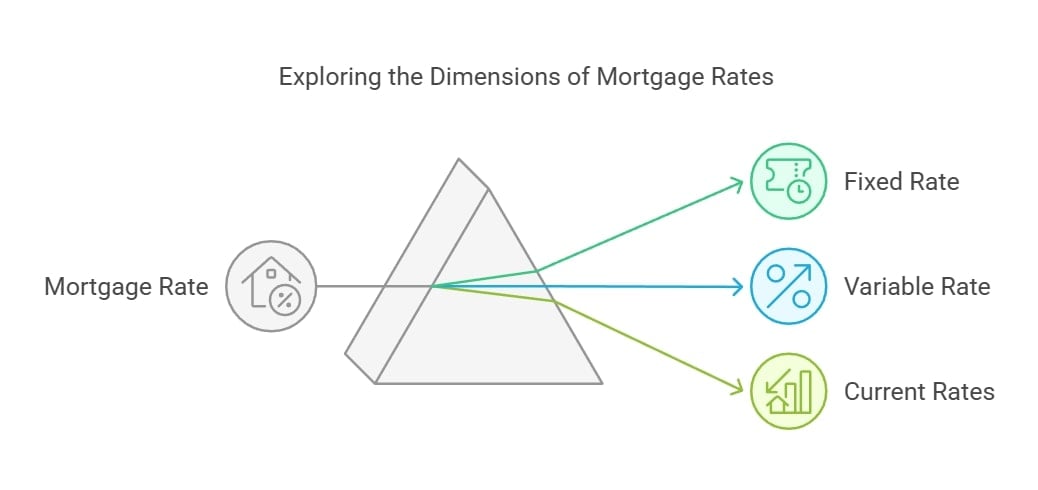
DON'T MISS OUT! Try Our FREE Calculator Now
In This Article, You Will Discover:
Request a FREE call back discover:
- Who offers the LOWEST rates available on the market.
- Who offers the HIGHEST release amount.
- If you qualify for equity release.
Mortgage Rate Predictions for 2025 and 2026: Interest Rate Forecasts
As we move into 2025 and beyond, understanding mortgage rate predictions becomes essential for both potential homebuyers and current homeowners looking to refinance.
Mortgage rates, influenced by various economic factors, play a significant role in determining the overall cost of borrowing.
This article will delve into the intricacies of mortgage rates, the importance of interest rates, and the factors that could influence future predictions for 2026 and beyond.
Understanding Mortgage Rates
What is a Mortgage Rate?
A mortgage rate is the interest charged on a mortgage loan, which fundamentally determines how much borrowers will pay in interest over the life of the loan.
These rates can either be fixed, meaning they remain constant for the duration of the mortgage, or variable, where they fluctuate based on market conditions.

As of November 2025, the average two-year fixed mortgage rate at a 60% loan-to-value (LTV) was recorded at 4.38%, while the average five-year fixed mortgage rate stood at 4.32%.
Understanding these rates is crucial for making informed decisions in a fluctuating market.
The Importance of Interest Rates
Interest rates are pivotal for borrowers as they directly influence the cost of borrowing.
When interest rates are low, borrowing becomes more affordable, encouraging increased spending and investment, which can stimulate economic growth.
Conversely, higher interest rates lead to elevated borrowing costs, potentially dampening economic activity.
The Bank of England sets the base rate, which significantly affects mortgage rates; as of December 2025, this base rate was at 4.75%.
Such rates are crucial because they shape the lending rates that banks offer to consumers, impacting their financial decisions.
Factors Influencing Mortgage Rates
Several factors influence mortgage rates, including the Bank of England's base rate, inflation rates, and the broader economic landscape.
For instance, rising inflation can erode the purchasing power of money, prompting lenders to increase interest rates to maintain profit margins.
Additionally, supply and demand dynamics in the housing market can sway rates; when there is high demand for mortgages, rates tend to rise.
Other critical determinants include the borrower's credit score, the deposit amount, and the length of the mortgage term, all of which contribute to the overall mortgage rate predictions for 2025 and 2026.
Current Mortgage Rate Trends
Analysis of Current Rates
As of December 2025, mortgage rates have exhibited notable volatility, impacting borrowers significantly.
Some lenders have opted to increase their rates on fixed deals, while others have reduced them.
The average two-year fixed mortgage rate peaked at 5.8% in mid-2023, before dropping to approximately 4.4% by the end of 2025.
This fluctuation in rates indicates a market that is beginning to stabilise, although experts caution that if inflation continues to rise, further increases in mortgage rates may occur, potentially affecting monthly mortgage repayments.
Impact of the Bank of England Base Rate
The Bank of England's base rate is a critical benchmark for determining mortgage rates across the market.
After a series of increases that saw the base rate peak at 5.25% in August 2023, it was subsequently cut to 4.75% in November 2025.
This reduction is anticipated to positively influence mortgage rates, potentially leading to lower borrowing costs for consumers seeking new mortgages or refinancing existing loans.
However, the expected cuts in the base rate for 2026 hinge significantly on inflation trends and broader economic growth, making it essential for homeowners to stay informed.
How House Prices Affect Mortgage Rates
House prices play a substantial role in shaping mortgage rates. When house prices rise, lenders often perceive a higher risk associated with lending, which may lead to an increase in mortgage rates.
Conversely, stable or declining house prices typically result in lower rates as lenders feel more secure in their lending practices.
As we approach December 2025, forecasts suggest that house prices may increase due to rising wages and improved buyer affordability, which could further influence the mortgage rate landscape in the coming years, impacting potential homebuyers and existing homeowners alike.
Mortgage Rate Predictions for 2025
Expected Changes in Rates
Looking ahead, experts predict that mortgage rates are unlikely to fall significantly in 2025.
The expectation is that they will stabilise around the 4% to 4.5% mark. Although some lenders may reduce rates slightly in response to market conditions, overall, rates are projected to remain higher than the ultra-low levels seen in previous years.
The forecast for the end of 2026 hints at potential cuts to rates, with predictions suggesting a range from 3.5% to 4%, contingent upon economic conditions and inflation rates, which will significantly affect mortgage rate predictions.
Economic Indicators Influencing Predictions
Key economic indicators, including inflation, employment rates, and overall economic growth, will play a pivotal role in shaping mortgage rate predictions for 2025.
For instance, a surprising rise in inflation to 2.3% in October 2025 has led analysts to revise their forecasts.
The Bank of England's forthcoming decisions regarding interest rates will largely depend on these indicators, as they strive to balance inflation control with the necessity of supporting economic growth, making it crucial for borrowers to monitor these economic trends closely.
Potential Rate Cuts and Their Implications
The potential for rate cuts in 2026 is anticipated as the Bank of England aims to manage inflation effectively.
Should the base rate be reduced to around 3.5%, mortgage rates would likely follow suit, offering much-needed relief to borrowers.
However, predictions vary, with some analysts suggesting that rates may only decrease modestly.
The implications of these cuts will be significant for homeowners, particularly those transitioning from fixed-rate mortgages to potentially higher variable rates, as they navigate the changing landscape of mortgage repayments and financial planning.
Forecast for Mortgage Rates in 2026
Long-term Predictions for Interest Rates
Long-term predictions for interest rates suggest a gradual decline, with forecasts indicating that the Bank of England base rate could fall to around 3.5% by early 2026.
This decline is expected to influence mortgage rates positively, potentially making borrowing more affordable for both first-time buyers and current homeowners looking to refinance.
However, the pace of these cuts will depend on economic recovery and inflation control measures implemented by the Bank of England.
As interest rates fall, borrowers may find themselves in a more advantageous position, making it essential to stay informed about these developments.
What to Expect for House Prices
House prices are projected to experience modest increases in 2026, with predictions ranging from 1.1% to 4% growth.
Factors contributing to this growth include rising wages and improved buyer affordability, creating a more competitive housing market.
As the housing market stabilises, buyers may find themselves in a more favourable position, leading to increased competition for homes and potential upward pressure on prices.
A higher average house price can also influence mortgage rates, as lenders may adjust their offerings based on perceived risk. Thus, understanding these market dynamics is crucial for prospective homeowners.
Preparing for Future Mortgage Payments
Homeowners should prepare for potential increases in mortgage payments as they transition from fixed-rate deals to new loans.
With the average five-year fixed mortgage rate at 4.86%, borrowers may face higher payments than in previous years, particularly as they explore options for remortgaging.
It is advisable for homeowners to review their financial situations, assess their options for remortgaging, and consider locking in rates before anticipated increases occur.
This preparation can help mitigate the impact of any potential interest rate hikes, ensuring that homeowners remain financially stable in the evolving market.
Making Sense of Mortgage Rate Changes
How to Choose the Best Mortgage Type
Choosing the best mortgage type depends on individual financial circumstances and market conditions.
Fixed-rate mortgages provide stability and predictability in payments, which is particularly appealing in a fluctuating interest rate environment.

In contrast, variable-rate mortgages can offer lower initial rates but come with the risk of increasing payments, which might not suit all borrowers.
As of December 2025, fixed-rate mortgages are generally more favourable than variable rates, making them a popular choice among borrowers seeking certainty in their monthly mortgage repayments amidst the anticipated rate changes.
Monthly Mortgage Payment Calculations
Calculating monthly mortgage payments involves considering the loan amount, interest rate, and loan term.
For example, borrowing £200,000 at a 4.38% interest rate over 25 years results in monthly payments of approximately £1,098. Using mortgage calculators can help potential borrowers understand their financial commitments and plan accordingly.
With mortgage rates expected to fluctuate, accurate calculations will allow borrowers to gauge their affordability and make informed decisions when applying for a new mortgage or refinancing an existing one.
When to Consult a Mortgage Broker
Consulting a mortgage broker is advisable when navigating the complexities of mortgage options and securing the best rates.
Brokers can provide valuable insights into market trends and help assess individual financial situations, ensuring borrowers find suitable mortgage products that align with their needs.
This is especially beneficial for first-time buyers or those transitioning from fixed-rate mortgages to variable rates.
By leveraging a mortgage broker's expertise, borrowers can make informed choices that position them favourably in the evolving landscape of mortgage rates and repayments.
WAIT! Before You Go...




